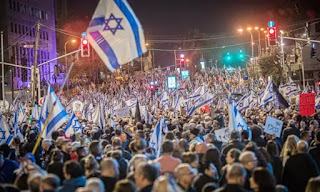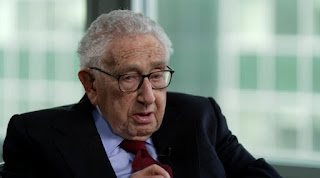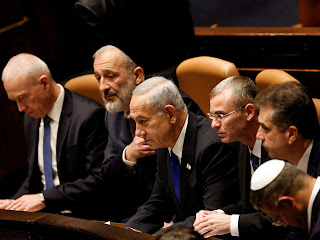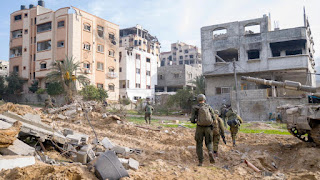Israeli outrages along the streets
Israeli outrages along the streets
What’s is currently at stake for Netanyahu government
During the latest months the world has been watching what’s it’s revealing to be as an alarming
as thrilling escalation of protests in Israel, caused by both the non violent uproar
inside the country, still ongoing after over 10 weeks, against the reforms of
the judiciary system, and the bloody conflict in its long-lasting struggle against Hamas and the historical war that
keeps on opposing them to the Palestinians, that are causing many deaths
especially in the West Bank and Jerusalem. This awful situation has recently
pushed the secretary of State Anthony Blinken to make a visit on the ground at
the very frontline last February after the Israeli raid in the refugees camps
of Jenin in Cisgiordania. Along with Blinken journey in Israel, other than in
Palestine, Egypt and Cisgiordania, in an effort to restore the dialogue and to
find pacific solutions for this Middle East crisis, are being taking rounds of
talks that have shown how the Israeli- USA relationships, although their common
values (at least in the proclaimed intentions and political programs by whose virtue Netanyahu has been elected) are changing and are becoming more and more
complex.
Israeli
democracy is at risk. Now more than ever, mainly because of the Netanyahu Parliement stance to
override the Supreme Court decisions by adopting its own laws that could surpass
the effectiveness of its sentences. At the origins of this political novelty there’s been a strenuous
opposition between a center-right Knesset, whose majority also consists of
orthodox and far-right parties, and a Supreme Court, whose judges are belonging
to the left wing sphere of influence. The religious zionism is a party made up of homophobic
elements. All these are only some of the factors that have caused the
impossibility to reach a reliable agreement on a written constitution, being
the political panorama so heterogeneous and fragmented.
Therefore, it’s happening a dreadful
ideological conflict, remarkable for being undermining and twisting the essence
of democracy, that, if put effectively in place, will destroy the traditional
partition of powers of the checks and balances system.
Certainly the USA won’t give up on the defence
of the liberal core values currently jeopardized in the country, where more than
150000 citizens are showing up in the streets and squares, exercising their political freedoms in
absolutely totally pacific demonstrations that are deploying all their strength
to make the voice of people heard in front of this constitutional and institutional
crunch.
Israel, as said, has no written constitutions but is endowes by basic laws and customes that make it close to the western traditions. While Palestine is a UN Non-Member Observer, Israel, although having gained a full membership since 1949, keeps on perpetrating gross human rights violations but, as pertaining our field of investigation, it re-baptized itself as “Jewish and Democratic State” of Eretz-Israel (Land of Israel), that hightlig a “Declaration of Independence” and ““Basic Laws: Human Dignity and Liberty”, 1992, that aim to be a basis for the future constitution. In them, it’s declared the guarantee of “a complete equality of social and political rights to all its inhabitants irrespective of religion, race and sex, [..] the freedom of worship, conscience, language, education and culture; [..] the safeguard of the Holy places of all religions and to be faithful to the principles of the UN Charter”.
Unfortunately, these norms
are merely declarative, being now possible for ordinary legislation overriding these
generic principles that don’t prevail on statutory rules and jurisprudence.
Currently Benjamin Netanyahu has
a majority of 64 seats over 120. As a consequence, he wouldn’t face any
difficulty or hardness to proceed in his direction, if he wouldn’t be refrained
by the strong opposition of the civil society whose rallies and shoutings are
inflaming the international public opinion.
It’s now impossible and
unclear forecasting what will happen next months and it’s feared a spiralling drop-down of the
situation for the incoming Jewish Easter and the Arab Ramadan, that this year
coincide in the same period. Up to now It’s hard to make predictions as a
complete reverse seems unfeasible, and an implosion of the government and a
coup d’Etat other than the creation of police state, where the institutions and
the citizens must obey to the Armed Forces, are not to be excluded. Although
the Supreme Court itself has declared this reforms plan unconstitutional, now
Netanyahu political challenge seems to be that of making the law approved and
to put an end to this structural affair that, as he said, will be as tossing up
a plaster: a little bit painful but a quick process, playing out the role of
the civilians demonstrations as the Parliement has been democratically elected.
Moreover, Netanyahu government
is easing and liberalizing for its population the way they can freely take
possess of weapons and has shown its readiness to use its own iron fist against
the mass protests.
Ineffective has been revealed
to be the mediation initiative of the president Herzog but it’s also true that Netanyahu
has a limited space of action as the
Likud party resulted winner during last elections especially thanks to its
alliance with far right and extremists parties and as bribery trials are
pending against him (main reason backing his interest to the judiciary system
overhaul).
However, the negotiations are
still restrained but it’s likely that, consequently to the almost tepid reaction and scepticism demonstrated by the
Israeli allied in the MENA region and the weight of the inner population
outcries, the reform that will pass will be highly softened and fruit of tiring
compromises.
Notwithstanding the
proclaimed pause on judicial reform plan, the mass demonstrations and the
public anger in Israel keep on rising and standing out as, for the protesters,
this step is insufficient to restore and protect the foundations of liberal
values and they claim to scrap entirely this plan. Thus, in conclusion, the
turmoil doesn’t stop on ravaging the inflamed Israeli streets and the peace
process within this country other than with its Palestinian neighbours, seems
far to be established yet, leaving the international community audience
perplexed and alarmed for the destiny of what has always , so far, been
considered the greatest herald of democracy in the Middle East, although, as
denounced by many NGO, it has been smeared of the crime against humanity of
apartheid and been the main perpetrator of persecutions against the arab minorities
on its soil, in the name of the fight against terrorism, reaping victims
against helpless civilians and making a significant contribution to the scaling
up of unjustified violence and levels of tension.
In this context of everlasting collision between
Arabs and Jews, thus, the bill of reform of the judiciary system looms as a
derailment of the democratic system in the direction of a more and more
authoritarian regime under the leadership of the far right parties, driving to
a framework of consistent disorders and instability.





Comments
Post a Comment